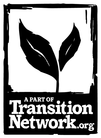Strong connection to neighbors makes a resilient community
The first home visited belonged to a couple who have transformed their bungalow by adding passive solar, active solar panels, energy efficient appliances and lighting, water harvesting and reclamation(grey water), an ample vegetable garden, and public access in the front yard with an inviting bench and free library.
The second home belonged to an artist and his family. They have transformed their front yard to native drought tolerant plants with swales. Their focus centered on how to redesign your yard.
The third home belonged to a family that redid their yard to incorporate art, lush plants, and have a low water profile. They used yucca as dramatic accents. This family revolves around art. They, too, have instituted welcoming seating to invite their neighbors in, and surrounded it with original art.
Many thanks to Jill, Anthony, Eric, and Robert, and their families for sharing their homes with us.
We ended the walk with an opportunity for coffee and conversation at 6:45 at Sidewalk Café in the historic Hen’s Teeth Plaza. Pasadena Water and Power was on hand with information and a short presentation on Pasadena’s “Laundry to Landscape” rebate offer. Rolan Solayan and John Hoffner answered questions. Conversation ensued. The neighbors were interested in the program, and discussed ways to help each other install grey water systems.
Neighbors networked and came up with great ideas for the neighborhood. Jessica pitched the idea of organizing a gardening circle, that would be based on neighbors helping neighbors to install and maintain food gardens. Ed, a neighbor who serves on Pasadena’s Environmental Advisory Commission, urged everyone to attend a commission meeting.
Meetings are the 2nd Tuesday of every month at 6pm in the
Permit Center Hearing Room
175 N. Garfield
Pasadena 91101
He reminded his neighbors that each voice can make a huge difference.
This type of sharing and interaction builds strong relationships. Strong relationships are the backbone of resilient communities.
— January Nordman



